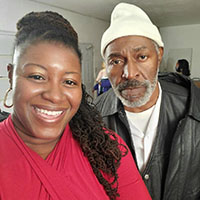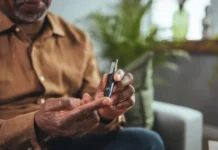
By Hazel Trice Edney
(Trice Edney Wire) – Since she was a little girl, Thometta Cozart has looked up to her father as hard-working, humble and soft-spoken; yet a fun-loving man who is often the life of the party.
“He’s always been the center of our family for events, parties and celebrations,” she recalls. “And he gives to his detriment,” she said, describing his generosity and self-sacrificing nature.
Named partially after him, Thomas, and her mother, Loretta, Thometta is their only child. She recalls him working long hours on construction sites to install electric poles and lines. In her mind, he a pillar of strength and hard work.
But in May of 2019, their relationship changed forever when he suffered a hemorrhagic (bleeding) stroke. In a sense, they drew closer with the uncertain prognosis. Would he face long term paralysis? Would his speech be slurred? How much would this debilitating stroke affect the future of a man who has served as a surrogate father to so many?
Because of her job as multicultural outreach and health equity director of the Epilepsy Foundation, Thometta Cozart knew how to prepare for potentially the worst outcomes. With proper nutrition, intense physical therapy, cardiac care and medication, her father had a fighting chance to recover and live a good life. Because he decided to put his health first for a change, Mr. Cozart, now 67, is still progressing.
“My dad experienced some cognitive delays, slurred speech, and a weakening of his limbs, which caused him to need physical, speech and cognitive therapy afterwards. After the stroke, he retired from his job and went on Disability. With therapy, he regained his strength to take care of himself and speak clearly. His memory has also improved. But he does need some things to be explained to him multiple times or slowly explained to him.”
A realist who often leans on her faith, she also knew that the kind of stroke that her father had suffered – the ischemic stroke caused by blood clots- increased the chances that he might experience seizures in the future.
Seventeen months later, on Oct. 10, 2020, her fears were realized. Thomas Cozart, with no history of seizures or epilepsy, had a seizure while at home watching TV with a friend who noticed that his eyes had rolled to the back of his head, he had begun to convulse and was in a state of confusion. His friend called an ambulance, and was able to recall the seizure first aid resources Thometta had offered her family.
Once again, her education and experience kicked in. Because she knew that strokes are a major contributor to how African Americans develop epilepsy, as her father’s chief medical advocate, she had to make sure that he had a neurologist, who was knowledgeable about seizures, on his medical team.
Although his doctors did not directly attribute the seizure to the stroke, the implication was clear, she said. “His doctors advised that he more than likely had a seizure as a result of his stroke.”
In addition, there were still issues with managing his blood pressure, and there was atrial fibrillation (Afib), she said, which is a quivering of the heart or irregular heartbeat, which may have also contributed to him having additional seizures if he hadn’t seen a neurologist right away.
He was given Keppra, an anti-epileptic medication known as a first line of defense against seizures. Largely because of that, she said, not only has he not had another seizure nearly a year later, but neither does he have epilepsy.
Thomas Cozart is fortunate that his daughter’s profession has empowered her with knowledge that has gone miles to help her with his care and health advocacy. But millions of people around the nation know little about the connection between seizures and stroke. And health disparities among African-Americans are sometimes due to a lack of knowledge about how to prevent a stroke; much less the seizures that might result from one.
“I do this work every day – talking about inequities and injustices in the health care system,” she said. Studying notes and charts, she has learned much. “But, this situation has caused me to have to live it,” she said. “There is a bias in the health care system where if you don’t have people advocating and holding people accountable, the patient may not get adequate care.” This is due to various factors, she points out. “But it’s often because of race and implicit bias of some healthcare providers.”
On World Heart Day September 29, 2021, the statistics remain clear:
“Nearly one in 10 stroke survivors will experience a seizure, which is why the Epilepsy Foundation and the American Stroke Association, a division of the American Heart Association, have teamed up to educate stroke caregivers and their loved ones about how to recognize both stroke and seizures as medical emergencies and what to do in these situations,” says a press release announcing the first-time collaboration. A Seizure Recognition and First Aid Certification training on World Heart Day will occur as part of the collaboration between the Foundation and Association.
“Epilepsy and strokes are two significant public health issues that have serious risks, yet lack awareness,” said Brandy Fureman, Ph.D., chief outcomes officer, Epilepsy Foundation. “Our collaboration with the American Stroke Association is important to provide stroke survivors, particularly older adults, with the tools they need to improve their quality of life, as well as educate their loved ones on Seizure First Aid.”
Like most health disparities, racial and ethnic individuals living with epilepsy may experience poorer health outcomes. A survey by the National Health Interview Survey (2017) and National Survey for Children’s’ Health (2018-2019), concludes that more than 578,000 Black Americans have been diagnosed as having epilepsy or a seizure disorder. The Epilepsy Foundation estimates that over 25,000 Black Americans are diagnosed with seizure disorders or epilepsy each year. As published in the Epilepsia Journal, stroke is the cause for around 11 percent of adult epilepsy cases, and nearly 45 percent of new epilepsy cases are in those 60 and older. Stroke is one of the leading causes of epilepsy in adults.
To remember the warning signs of a stroke, remember F.A.S.T. That stands for Face drooping. Arm weakness. Speech difficulty. Time to call 911.
Would you know what to do if your loved one had a post-stroke seizure? Remember: Stay.Safe.Side. STAY with the person and start timing the seizure. Keep the person SAFE. Turn the person onto their SIDE if they are not awake and aware.
For African-Americans, there are often specific ways to prevent stroke and heart disease. For example, Mr. Cozart made lifestyle changes that have improved his heart and life astronomically.
“My father no longer drinks alcohol, he reduced his consumption of pork and high sodium foods, and his retirement helped him to not work as hard or be as stressed,” Thometta says. “However, ultimately, my dad needed an ablation procedure to address his Afib heart condition, which he finally received on March 30, 2021.”
She adds, “All African-Americans who have a history of strokes in their family and/or a stroke survivor should be advised about seizures immediately after their stroke and should be offered Seizure First Aid Training, along with their families and caregivers.”
Finally, “We are making sure that he has routine and preventative care which a lot of Black men don’t do.”
Otherwise, “He’s doing really good now,” says Thometta. “He has been weaned off of home health care. Our family realizes his situation definitely could have been another way.”















